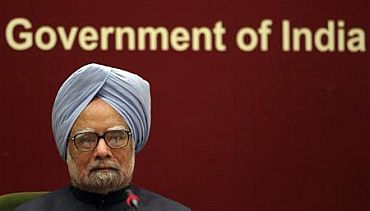
Renu Mittal takes a hard look at the two years of the United Progressive Alliance government.
It was the same time last year when Prime Minister Dr Manmohan Singh cancelled the first anniversary celebratory dinner of his government after an Air India Express aircraft crashed in Mangalore, killing over a hundred passengers.
It was seen as a bad omen for a government lurching from one crisis to another in the first year, despite increasing its seat tally from 147 to 206, decreasing the number of its allies, in particular, jettisoning the troublesome and anti-reformist Left parties.
And now with the second anniversary just a day away, there is another long shadow on the festivities with Dravida Munnettra Kazhagam member of Parliament Kanimozhi arrested and settled in Tihar jail. Her anguished father, DMK chief M.Karunanidhi said he was hurt by the arrest of his daughter, and called a general council of his party to review relations with the Congress and the United Progressive Alliance government.
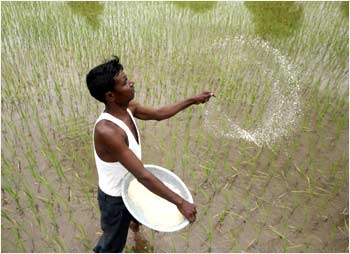
In the last two years, an already-humiliated prime minister has further lost face, as politically, his government has been hemmed in by innumerable corruption charges leading to the sacking and arrest of one of his ministers.
Taking the big picture of the UPA government into focus, it reads as the story of a party which rode to power on the back of some excellent schemes in the first term of the UPA, which included National Rural Employment Guarantee Act, waiving off farmers' loans, and the Right To Information Act. But then soon after being re-elected, it lost the way and is now seen as a government living from one crisis to another.
It reads as the story of a government where the most powerful leader Sonia Gandhi has, to an extent, distanced herself from her chosen prime minister and his government, but finds herself helpless to act.
The PM has told his party categorically that he has a great deal of unfinished business to attend to, and would remain in power till the next general elections in 2014.
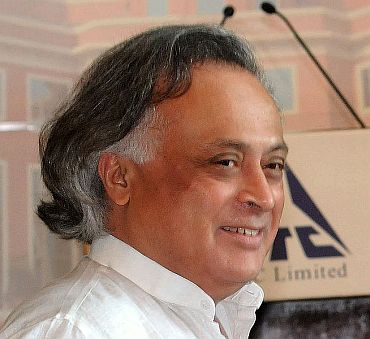
It reads as the story of a young heir to the Nehru-Gandhi family throne, who finds that he is not ready for power or to take on responsibility, but has been trapped by manipulative Congress managers into handling the affairs of the Youth Congress and the National Students Union of India, seen as a waste of time even at the best of times.
So much so, that one is forced to believe that his advice on both party and government matters is ignored many a times. Politically, he has neither grown nor shown any signs that he would be the leader which the Congress needs to stage a great comeback as a single party government.
In the last two years, Union ministers have functioned as independent authorities, running their own fiefdoms, much to the embarrassment of the government as a whole.
If P Chidambaram as the Union home minister put the brakes on a Chinese telecom company on the grounds of security, then a junior minister such as Jairam Ramesh was quick to challenge his own home ministry by issuing a statement from China on how good the telecom company is and why the country needs the Chinese.
Because of his closeness to Rahul Gandhi, Ramesh is neither pulled up nor asked for any explanation, allege party leaders.
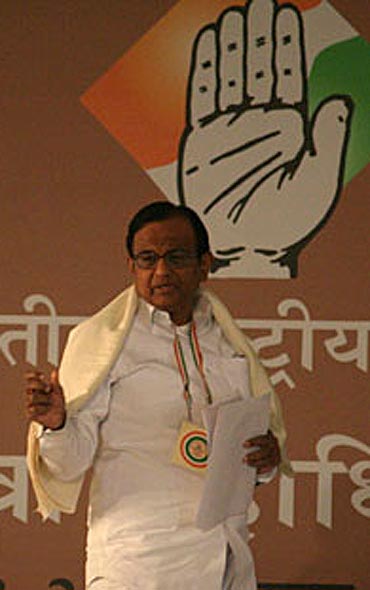
The same appears to be the case with Home minister P Chidambaram. Despite facing embarrassment over the "most wanted" list, the goof-up by the home ministry has done little to dent his clout, as he was sent to Kolkata at the swearing-in of Mamta Banerjee as the representative of the Congress president.
In the second term of the UPA, there is no Common Minimum Programme, or no steering committee, as it is virtually seen as a Congress government since alliance ministers such as Mamta Banerjee and MK Azagiri of DMK have not been attending group of ministers' meetings as they are preoccupied elsewhere.
But despite that, the PM blamed coalition pressures on the poor functioning of his government. Among the allies, Sharad Pawar continues to play with the agriculture field by exporting items such as rice, wheat, sugar etc and then importing them when the prices have increased.
A process which hits the aam admi the hardest, but despite a large volume of evidence, the prime minister has been unable to check Pawar just as he has been unable to check inflation, so much so that the target of the growth rate has decreased to 8 per cent from 9.5 per cent.
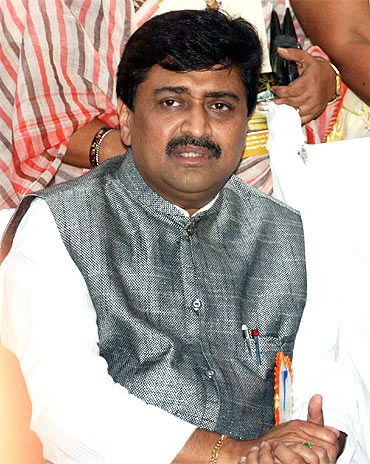
UPA II has been a saga of ministers having to resign one by one. Beginning with the blue-eyed Shashi Tharoor, Ashok Chavan was sacked in Maharashtra, A Raja was sent to Tihar where he is still lodged, Common Wealth Games Chief Suresh Kalmadi and his entire team were arrested and are in jail. And now its Kanimozhi's turn.
While the higher judiciary was attacking and pulling up the government on a daily basis, the exit of Chief Vigilance Commissioner P J Thomas came as a personal setback to the PM, who was instrumental in his selection with the backing of the powerful and all pervasive Malyali lobby in the Prime Minister's Office.
The fact that Manmohan Singh has chosen to continue with the same set of bureaucrats who have grown roots, developed their own vested interests and have backed and supported favourites is a telling comment on a PM.
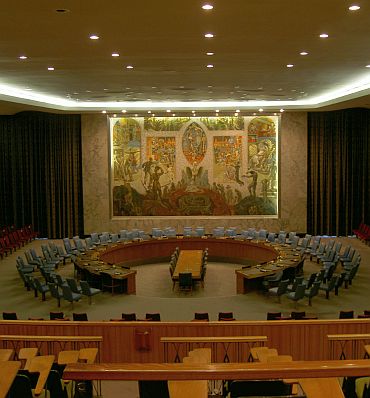
What the PM has however been successful in is the foreign policy front where having brought in S M Krishna as Foreign Minister, who has run the foreign establishment according to his own diktats.
In 2009, the heads of all the P5 countries visited India, which was seen as a huge jump for India. We became a non-permanent member of the UN Security Council after 18 years and resumed the dialogue process with Pakistan. Now he is going to Africa to start a new era.
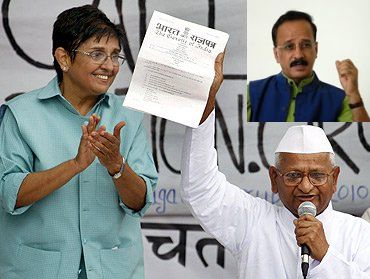
What has brought cheer to the Congress is that despite the continuous hiccups including the hammering the government got in Parliament over corruption, and the constant stream of scandals, the party has performed credibly in 3 out of the 5 state assemblies where elections were held.
While there was no BJP in these states, the real test for the congress will come in those state assemblies where it is pitted against the Bharatiya Janata Party, such as Punjab and Uttarakhand in the next round.
It's a government which has not been able to send a strong message of either governance or development or of breaking new ground or of taking out of the box initiatives.
It's a government which is looking old and tired, as was witnessed during the Anna Hazare tirade on corruption, when ministers failed to stem the tirade or seize the initiative, as it became clear that the government had failed to use its skills to persuade the media of its point of view.
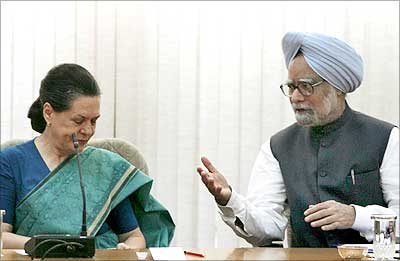
The fact that little or no accountability is fixed in either the UPA or the Congress party, even on matters of international embarrassment like it happened in the preparation of the Most Wanted list, or that a GOM is constituted to sell the government's view point to the media, but fails to take off, and has only had one briefing in the last 10 days, speaks volumes of the manner in which the government has handled critical and sensitive subjects.
In the last one year, the mood in the Congress and the government has become one of gloom, said a senior party leader. He admitted that Lok Sabha MPs were worried about whether they would be able to win in this atmosphere, but were not sure whether Sonia would be able to retrieve the situation by acting decisively and in time.
According to a senior minister, the reading of the political situation was that with three years to go for the next general election, the time had come for her to act and bring in a new leadership in the government.